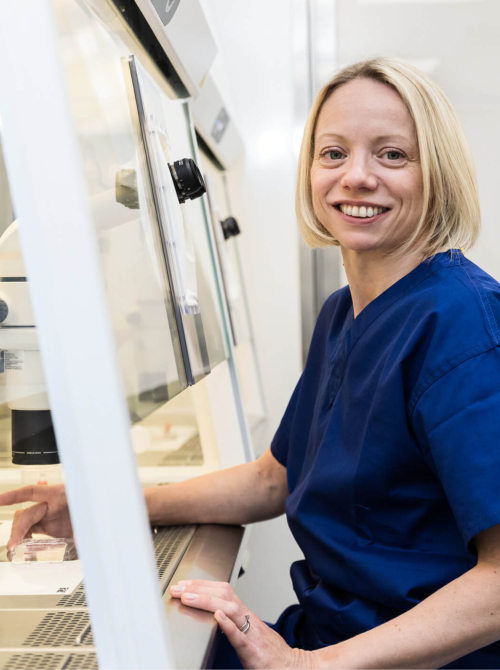IVF over 40: What You Need to Know
Are you in your 40s and wondering what your chances are of getting pregnant with IVF? Mr Ed Coats, Medical Director The Evewell West London, discusses how age affects fertility and what can be done to increase your chances of conceiving with IVF if you’re over 40.
IVF over 40: What You Need to Know
Are you in your 40s and wondering what your chances are of getting pregnant with IVF? Many women delay starting a family for a variety of reasons. You might have been focused on your career, waiting for the right partner or simply not ready to have a child yet.
Whatever your reasons, you might be worrying about how age affects fertility and what can be done to increase your chances of conceiving with IVF.
Why do our chances of getting pregnant decrease as we age?
Women are born with a finite number of eggs. As time passes, there is a decrease in the number of eggs, which results in a decline in fertility and therefore fewer quality eggs available for the fertilisation process during an IVF cycle.
By the age of 40, fertility has fallen by half. On average, there is a 20% chance of getting pregnant per cycle at the age of 30. However, at 40, the chance of getting pregnant per cycle decreases to just 5%. By the age of 45, this chance decreases even further to only 1%.
Can I still have IVF if I’m in my 40s?
Advancements in reproductive technologies have made it possible for women to conceive even if they have crossed the ‘advanced maternal age’ bracket of 35 years. However, a lot of women might be wondering how successful IVF is if you’re over 40.
The good news is, with the right kind of clinical care and skill, and high attention to detail, you can still explore IVF even if you are over 40.
How can I increase my chances of conception over 40 with IVF?
There are a number of considerations we look at to increase chances of IVF success in patients over 40, and we’ll explore these in this article.
But one large factor we focus on here at The Evewell, is creating a personalised IVF protocol treatment plan, that will be unique to the patient’s previous medical history.
We then conduct close monitoring, by way of ultrasound scans and blood tests every two to three days, so we can ensure you are reacting optimally to the ovarian stimulation medication.
Both of these tailored approaches help us achieve optimum egg collection scenario, to then pass on to our highly experienced team of embryologists for either IVF or ICSI development.
Should I consider multiple egg collections before transfer?
We often get asked how many IVF cycles will I need to have before a successful pregnancy?
A significant reason IVF fails, or a patient experiences recurrent miscarriage or implantation failure, is because of chance chromosomal abnormalities within the embryo.
Women over 40 who considering IVF treatment should be prepared to go through more than one egg collection cycle, and consider screening their embryos with PGT-A, before starting an embryo transfer cycle, to ensure only one chromosomally normal embryo is transferred.
This screening tool (PGT-A) has been show it can shorten the length of time to a successful pregnancy, and minimise the number of embryo transfers and potential miscarriages.
This is because the quality of the eggs, as well as the quantity, declines with age. And therefore, the quality of the embryos and ultimately blastocysts, will also decrease.
Older women are more likely to have eggs with the wrong number of chromosomes, resulting in difficulties conceiving and higher chances of miscarriage or a pregnancy affected by a chromosomal condition.
How does PGT-A increase my chances of pregnancy if I’m over 40?
At The Evewell, we don’t just focus on achieving a pregnancy but on ensuring a live birth, which is why if you’re over 40, your consultant may speak to you about adding PGT-A into your IVF cycle.
Preimplantation Genetic Testing for Aneuploidy (PGT-A) is a procedure that checks for the presence of an abnormal number of chromosomes in embryos, before the embryo is transferred, ensuring only chromosomally normal embryos are transferred, possibly shortening the time needed for a successful pregnancy, particularly if you’re over 40.
It’s important to note here that PGT-A doesn’t change the outcome of the embryo, nor can it improve embryo quality, but it can help you make informed decisions for future fertility treatment plans, and it may also shorten the length of time needed to achieve a successful pregnancy.
Additional tests for women over 40
Depending on your medical history, your consultant may also suggest additional tests before considering an embryo transfer.
ERA (Endometrial Receptivity Array) is a test that involves a biopsy of the womb lining at the time when an embryo would normally be replaced inside the womb during treatment.
The ERA test measures the expression profile of 248 genes that have been identified as indicative of endometrial receptivity and using a predictor tool gives a specific diagnostic probability of receptivity. Therefore, the test result indicates if the endometrium is in optimal conditions for embryo implantation at that time or if exposure to progesterone is required. This may help to establish the optimal time for an embryo to be transferred.
EMMA (Endometrial Microbiome Metagenomic Analysis) is a molecular test that assesses the bacterial profile of the endometrium associated with a healthy uterine environment and successful pregnancy. This test can benefit any patient but is particularly useful for those experiencing recurrent implantation failure, as it provides insight into the microbial balance of the uterine cavity.
ALICE (Analysis of Chronic Infectious Endometritis) is a molecular test which detects the presence of pathogenic bacteria that most frequently cause chronic inflammation of the endometrium, known as CE. This has been linked to infertility and obstetric complications.
ALICE (Analysis of Chronic Infectious Endometritis) is a molecular test which detects the presence of pathogenic bacteria that most frequently cause chronic inflammation of the endometrium, known as CE. This has been linked to infertility and obstetric complications.
Diagnostic Hysteroscopy – this is a short procedure that involves inserting a small camera under anaesthetic into the uterus. This helps to identify any structural abnormalities, adhesions or scarring that may be hindering implantation. It can also helpfully be used to remove small polyps or fibroids that may be reducing the implantation potential of the embryo.
A Diagnostic ‘Trial Cycle’ is an approach used combining all of the tests here to ensure that the chromosomally normal (euploid) embryo has the best chance of implanting. Checking first that the ERA. ALICE and EMMA tests have not shown any abnormalities before thawing the euploid embryo in the real treatment cycle may help optimise implantation.
Reproductive Immunology
Reproductive immunology is an important area of fertility to consider as you get older.
Most people will not require additional help here, but if you have a prolonged history of infertility or recurrent miscarriage then the immune system may be contributing to this.
Looking at reproductive immunology tests in certain groups of patients may be of value these issues.
These are more advanced tests that may lead to adjuvant therapies used during your treatment cycle (e.g., steroids or intralipid) to aid implantation of the embryo.
Speak to your doctor about this in case they are relevant to you.
How to prepare yourself for IVF if you’re over 40
Certain lifestyle and dietary adjustments can improve the chances of conception through IVF.
A balanced diet with plenty of protein and healthy fats can reduce inflammation and support fertility. And certainly, quitting smoking, reducing alcohol and caffeine intake, and increasing consumption of fruits and vegetables can enhance the overall quality of eggs.
Read our article on how to increase fertility in women here.
What supplements should I be taking if I’m over 40 and want to do IVF?
As well as making tweaks to your diet and nutrition, we would also recommend you take the well as looking at supplements such as the below:
Co-enzyme Q10 (Ubiquinol)
CO-Q10 is a biomolecule that is present in every cell. It is a potent antioxidant that protects cells (eggs/sperm) by decreasing the damaging effects of oxidative stress.
It also plays a major role in cellular energy production (mitochondrial activity). As such, CoQ10 supplementation has been associated with an improvement in egg/sperm quality, and overall pregnancy rates.
How to use it: Ubiquinol 200mg twice a day OR CoQ10 200mg three times a day.
Vitamin D
Vitamin D is an essential vitamin that helps regulate the amount of calcium and phosphate in the body, which is needed to maintain healthy bones, teeth and muscles.
Vitamin D deficiency is associated with adverse events in pregnancy, such as pre-eclampsia, preterm birth, small for gestational age birth, and gestational diabetes.
How to use it: Ideally, use 1000iu once a day for 2-3 months before treatment if BMI < 30.
If BMI > 30 use 25mcg once daily for 2-3 months before treatment and continue taking until 12 weeks pregnant.
Folate
Folic acid is the synthetic form of folate, a naturally occurring B vitamin that is involved in DNA repair, cell division and tissue growth.
Taking folic acid helps to prevent neural tube defects such as spina bifida.
It may also help reduce the risk of pregnancy complications such as pre-eclampsia.
A 5mg daily dose is recommended for those who have a higher chance of their pregnancy being affected by neural tube defects (e.g. diabetes).
Talk to your doctor about which dose you should be taking.
How to use it: Take either 400mcg or 5mg (depending on your risk) orally once a day for 2-3 months before treatment and continue until the 12th week of pregnancy.
DHEA (Dehydroepiandrosterone)
DHEA is a steroid hormone that is converted by the body into male and female sex hormones (testosterone and oestrogen). This could potentially assist with poor ovarian reserve.
How to use it: Take a 25mg tablet 2-3 times each day for 1-2 months before treatment and stop taking it on the day of egg collection.
(Note: with prolonged use, it may cause you to have oily skin, acne and hair loss)
Omega 3
Omega 3 is an essential fatty acid. It may increase/promote regular ovulation, healthy cervical mucus production and blood flow to the reproductive organs. This in turn may improve the quality of the oocytes (eggs) and the endometrium.
In addition, omega 3 may reduce inflammation-related fertility issues such as endometriosis, uterine fibroids and ovarian cysts.
There is also a positive relationship between omega 3 and sperm quality (sperm count, morphology and motility).
How to use it: Ideally take 1000mg once daily for 2-3 months before eggs are collected and stop on the day of egg collection.
Read our article on supplements to increase fertility here.
Please be aware, our reproductive systems are complex, therefore it is important to consult a doctor before taking any supplements to ensure you’re taking the right amount of vitamins/minerals is critical as we need to create the correct environment for a healthy pregnancy. Some vitamins can have an undesired effect, if too much is taken, or they interact with other medications being taken.
Will I need donor eggs if I’m over 40?
The use of donor eggs is an option that women over 40 can consider during IVF treatment.
Donor eggs are retrieved from young, healthy women, increasing the chances of a successful pregnancy.
In such cases, the donor’s eggs are fertilised with partner or donor sperm, and the resulting embryos are implanted in the patient’s uterus.
The decision to use donor eggs is personal, and it is essential for women or couples to go through counselling and an informed consent process to make the right decision for their family planning future.
The Evewell success rates for over 40
When it comes to choosing a fertility clinic to help build your family, we recognise it’s not only a financial commitment but an emotional one too.
And, when it comes to comparing clinics, it can also be easy to become overwhelmed with data.
Our highly personalised approach to fertility treatment has resulted in more than double the national average for babies born for patients aged 38 and older, in each case per embryo transferred.
This is achieved by identifying the embryos that will be most likely to result in a live birth, considering the overall gynaecological health of the mother and transferring as few embryos as possible – a core focus of the HFEA.





